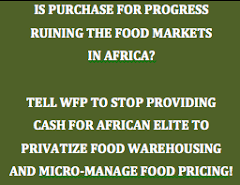U.S. Secretary of State Hillary Clinton stepped up a U.S. campaign to persuade the United Nations to appoint Ertharin Cousin, the U.S. ambassador to the U.N. Agencies for Food and Agriculture, to the top job at the World Food Program. But WFP's current leader, Josette Sheeran, is continuing to make her own case to donors and the U.N. leadership that she should lead the organization for a second five-year term, according to U.N. officials.
In a confidential Nov. 18 letter to U.N. Secretary General Ban Ki-moon, Clinton said she was writing "to nominate" Cousin as the U.S. candidate to be the next Executive Director of the World Food Program. "The United States believes Ambassador Cousin is eminently qualified to lead the World Food Program as it confronts challenges both old and new.... She would bring new energy to the organization's work," Clinton wrote.
Cousin, formerly president of the Polk Street Group, a Chicago-based public relations firm, has served in various corporate and non-profit jobs, including a stint at Albertsons, the food giant, and served as chief operating officer for America's Second Harvest, a national anti-hunger organization. Turtle Bay first reported earlier this month that the Obama administration wanted the job to go to Cousin.
The United States has long been the largest contributor to WFP, providing more than 40 percent of its budget in cash and surplus food supplies. The program has been a favorite of the U.S. food industry, which has benefited from a stable market of international crises. It has been politically popular in Washington because it helps project an image of the United States as a charitable nation, committed to feeding the world's poorest.
"This is good for the American farmer and producers because a lot of our food goes over seas," said Tony P. Hall, a former Democratic representative from Ohio who served as U.S. ambassador to the U.N. food agencies. The United States, he said, also "gets a lot of credit" for feeding the world's most needy. "I think people like the fact that the United States is helping."
As chief donor, the United States has also claimed a special right to appoint its own citizens to the organization's top job. If appointed, Cousin would be the fifth American to lead the world's largest humanitarian aid organization since it was founded in 1961.
She would replace Sheeran, a Bush administration nominee for the post, whose five-year term expires in April. Sheeran and Dan Glickman, a former U.S. Secretary of Agriculture during the Clinton administration, are also being considered for the job.
The WFP's executive director is formally selected by the U.N. secretary general and the executive director of the Food and Agricultural Organization, in consultation with the World Food Program's Executive Board.
But the U.N. chief traditionally has the last word, and officials said it would be uncharacteristic for Ban, who values his close relationship with the United States, to reject the Obama administration's official candidate.
The U.N.'s top food job is theoretically open to nationals from any country.
It has been held in the past by Australian, Canadian, El Salvadoran, and Dutch nationals. But it has gone only to Americans since 1992, when Catherine Bertini, who was nominated for the job by President George H. W. Bush, took over the top job at WFP.
She served a second term with the support of the Clinton administration, making her the only WFP chief who received backing of both Democratic and Republican administrations.
Bertini was succeeded by James T. Morris, a Republican nominee who served a single term, and then Sheeran. In recent months, Sheeran has sought to secure the support from the U.N. leadership for a second term.
In her annual address to WFP's Executive Board on Nov. 11, Sheeran touted her achievements at the food organization, including a policy aimed at increasing private sector contributions to the U.N. agency, and outlined her vision for its future. She announced plans to improve the internal financial controls and audit functions -- and to appoint a new monitoring and evaluation chief to improve financial oversight.
"She's determined to fight this out," said one U.N. official. "She's not acting like a person who is ready to leave at the end of the next quarter."
In her letter to Ban, Clinton made no direct reference to Sheeran, instead crediting Cousin for promoting reforms at WFP, and included a veiled swipe at the current leadership, speaking of the need for change.
She says Cousin "will bring a unique ability to inject fresh energy atop the organization as well as an intimate understanding of the World Food Program and its partners."
"The United States is deeply committed to the World Food Program and its remarkable work saving lives and protecting the livelihoods of billions around the world," Clinton wrote. "We are proud to be the organization's largest supporter, and we are confident it will thrive under Ambassador Cousin's leadership."
Clinton said the administration selected Cousin following an exhaustive interagency search. She described Cousin as "a central driver of the Obama Administration's global food security policy and its implementation, as well as a leading figure in efforts to eradicate world hunger."
Clinton said Cousin's priorities would include ensuring the food agencies "policies and programs are fully transparent" and she would "focus attention on administrative and internal management reform to promote greater accountability and operational effectiveness."
Follow me on Twitter @columlynch
 (c) UN Photo
(c) UN Photo







